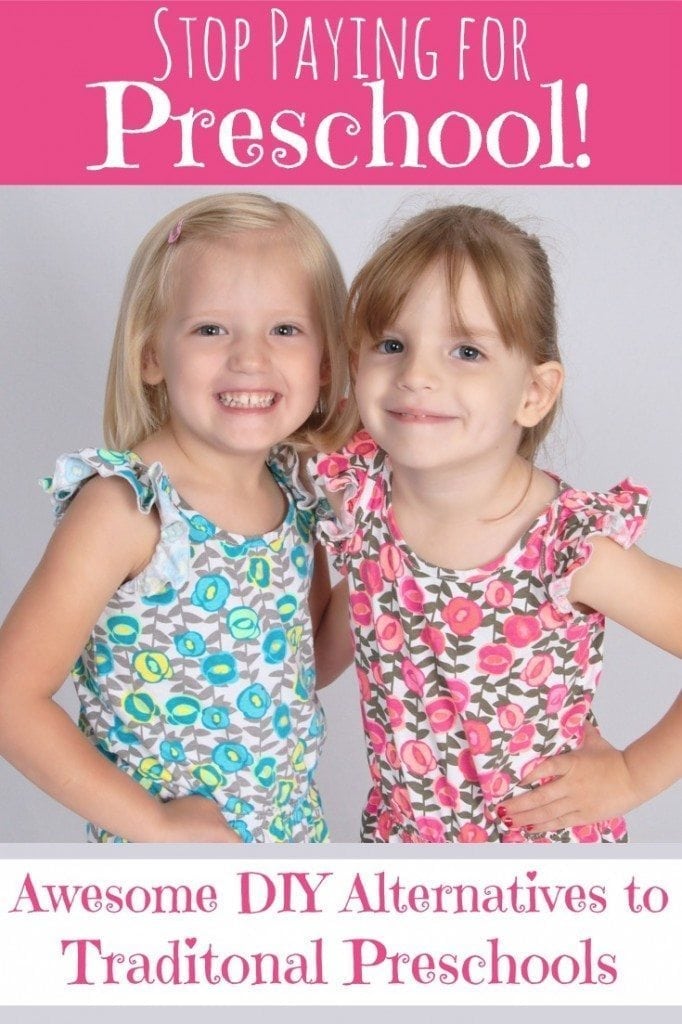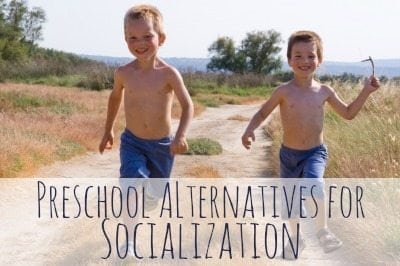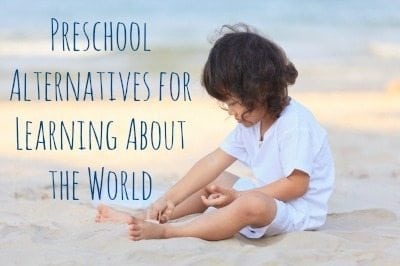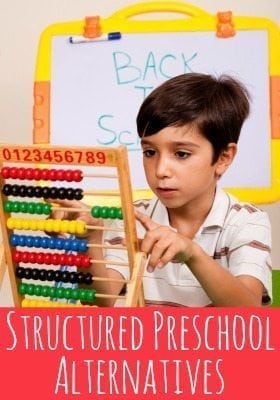Stop Paying for Preschool
THX, sumber dari : STOP PAYING for PREESCHOOL
Preschools can be expensive. Very expensive if it is a private preschool or offers a full-day option. I have found most of my friends are paying anywhere between $70-$300 a month on preschool, for one child, three days a week. When you are on a tight budget or have twins (like I do), then even a $70/month (x2) payment can be hard to justify, especially when everything a child learns at preschool can be learned at home or while exploring. That’s why I want to let you know that you don’t have to pay for preschool. There are so many wonderful preschool alternatives out there than paying for a two or three day a week preschool for your child! You can easily do simple things with your child and still have them completely ready for kindergarten without shelling out $1000 or more a year.
I don’t believe that our traditional preschool setting is needed for most children. Preschool is only truly beneficial to those who are considered at-risk, those who are sociology-economically disadvantaged. It’s a push to prove anything otherwise. I, myself, did not go to preschool, and I came from a low-income family
(I was the youngest of nine children). And yet I managed to graduate in
the top 5% of my graduating class of ~600 students. I also received
several scholarships and graduated from college with a 3.6 GPA. So,
going to preschool or not going to preschool is not a huge
deciding factor for future academic success for most kids. It just
isn’t, despite what politicians, magazine articles, educators, and
society at large want to tell you. However, it is also not harmful and
many children love attending preschool and do get practice sitting and
listening to an adult that is not related to them. It can
indeed be beneficial, especially for those needing early intervention,
but, again, it is not necessary. But, I do believe in early childhood
education – that is educating young children. And I think most of that
educating can come from a great home environment, parents/caretakers who
care, and from being proactive in getting out and about in your
community.
Almost every case I hear in favor of traditional preschool is because of social reasons. If you have a social kid, you might want to stick them in preschool because they’ll be with other kids! They’ll make friends. They’ll learn how to share, play, and get along nicely. But, there are so many preschool alternatives to paying
for your child to be with other children. Because, the truth is,
preschool and school in general aren’t inherently social. You still have
to sit still and be quiet during instructional time. The best social
interactions come during play time, which you certainly don’t need to be paying for.
There are so many great things to do with your preschooler to have
them learning their ABC’s, numbers, shapes, colors, and patterns. Life
is full of these things! Take opportunities in your day-to-day life to
point out letters on signs, in books, colors in objects all around you,
natural shapes, and the ways things are organized. It’s really that
simple. And include in some of the following as well:
 and Sesame Street programming
and Sesame Street programming . Others may love Super Why
. Others may love Super Why or Dora The Explorer
or Dora The Explorer . While not all “educational” TV programs are created equal, there is a lot of learning that can happen from watching them, as long as it’s limited and not the only educational enriching experience your child has.
. While not all “educational” TV programs are created equal, there is a lot of learning that can happen from watching them, as long as it’s limited and not the only educational enriching experience your child has.
 to help get those creativity juices flowing with to their hands-on projects delivered right to your door. (Use BACKTOSCHOOL10 for 50% off a new subscription).
to help get those creativity juices flowing with to their hands-on projects delivered right to your door. (Use BACKTOSCHOOL10 for 50% off a new subscription).
This is possibly the best part about an alternative preschool
experience. When you aren’t confined to a traditional classroom, you are
free to really explore all aspects of our world. I am all for hands-on
learning experiences, and not just talking about things like leaves,
twigs, and snowmen. Why just talk about them, or look at a 2-dimensional
version of them when you can do it for real? Let and encourage your
preschooler to touch real things and create with real materials (not
just paper in the shape of real things).
In case you want something that more closely resembles a traditional,
structured preschool environment, perhaps so you can tell strangers and
family members that your child is in a preschool (of sorts), I suggest
considering the following:
Have a set day(s) and time frame where you sit down and work with your child on something educational and call it preschool. This can be done by yourself or in a group.
There are lots of great preschool curriculum programs you can buy (or find for free online) to help with either your own at-home preschool or group preschool. I am a huge fan of Motherhood on a Dime‘s God’s Little Explorers: A-Z Adventures in God’s Word and World for Preschoolers. It is the program I will be using at home with my four year old twins this year. You can check out my review of it HERE and purchase a copy for yourself HERE. It’s only $17!
And, again, you can always follow an online program as well like ABCmouse.com (First Month Free!), ReadingEggs.com (Free 2-Week Trial), and Education.com (7-Day Free Trial).
Preschool-aged children are so much fun and I hope that these alternatives to a traditional preschool will help you educate your child in the best way possible for you and for them. And I hope you enjoy these precious years with your preschooler before they head off for kindergarten!
What do you do with your preschooler to encourage them to learn in fun and exciting, alternative ways?
Note: referensi mengingatkan untuk pribadi ^.-
Preschools can be expensive. Very expensive if it is a private preschool or offers a full-day option. I have found most of my friends are paying anywhere between $70-$300 a month on preschool, for one child, three days a week. When you are on a tight budget or have twins (like I do), then even a $70/month (x2) payment can be hard to justify, especially when everything a child learns at preschool can be learned at home or while exploring. That’s why I want to let you know that you don’t have to pay for preschool. There are so many wonderful preschool alternatives out there than paying for a two or three day a week preschool for your child! You can easily do simple things with your child and still have them completely ready for kindergarten without shelling out $1000 or more a year.
 Is Preschool Needed?
Is Preschool Needed?
I don’t believe that our traditional preschool setting is needed for most children. Preschool is only truly beneficial to those who are considered at-risk, those who are sociology-economically disadvantaged. It’s a push to prove anything otherwise. I, myself, did not go to preschool, and I came from a low-income family
(I was the youngest of nine children). And yet I managed to graduate in
the top 5% of my graduating class of ~600 students. I also received
several scholarships and graduated from college with a 3.6 GPA. So,
going to preschool or not going to preschool is not a huge
deciding factor for future academic success for most kids. It just
isn’t, despite what politicians, magazine articles, educators, and
society at large want to tell you. However, it is also not harmful and
many children love attending preschool and do get practice sitting and
listening to an adult that is not related to them. It can
indeed be beneficial, especially for those needing early intervention,
but, again, it is not necessary. But, I do believe in early childhood
education – that is educating young children. And I think most of that
educating can come from a great home environment, parents/caretakers who
care, and from being proactive in getting out and about in your
community.What is needed during the Preschool Years?
The preschool years are a great time to explore the world, learn some life skills, and have a lot of fun. It’s about recognizing patterns, reading great books, engaging in imaginative play and creativity. Preschool years are about figuring out connections, cause and effect, and mastering those fine-motor skills and some large gross motor skills too. What is needed during the preschool years is understanding of others’ emotions of personal responsibility, of developing a curiosity and a love of learning! The preschool years are supposed to be pressure-free and fun! So may I suggest, if you can, to skip the traditional preschool and do it yourself! You are your child’s first teacher and likely their best. They love you and look up to so much! So teach them some of what you know! For the preschool years you don’t need to be a qualified or certified teacher. You already know all your colors, shapes, numbers, words, seasons, holidays, days of the week, letters, and how to write with a pencil. You can teach your child quite a lot! And the following preschool alternatives will help:
 Preschool Alternatives for Social Needs and Etiquette:
Preschool Alternatives for Social Needs and Etiquette:
Almost every case I hear in favor of traditional preschool is because of social reasons. If you have a social kid, you might want to stick them in preschool because they’ll be with other kids! They’ll make friends. They’ll learn how to share, play, and get along nicely. But, there are so many preschool alternatives to paying
for your child to be with other children. Because, the truth is,
preschool and school in general aren’t inherently social. You still have
to sit still and be quiet during instructional time. The best social
interactions come during play time, which you certainly don’t need to be paying for.Play Dates and Play Groups
Setting up a play date or organizing a weekly play group can give your child lots of social interactions, and the kind they actually crave – free, wild, imaginative, uninhibited play. If you need to find other parents, check on Facebook – look for a local community group and ask around. Check in with any local homeschool groups.Kids in the Neighborhood and at Parks
Another great place for some awesome socialization is the playground and your own backyard or front yard. Take your child to a park and let them play with the other kids who are there. Encourage your kids to play outside and get to know some of the neighbor kids. I have always been amazed at how easy it is for my preschoolers to make friends at parks and in our own apartment complex. Everyone becomes a “friend.”Church
I go to church every single Sunday and my kids come with me. They not only learn how to sit still and (relatively) quietly for all of our worship/sacrament service, but they also then spend two additional hours sitting in chairs in a classroom, with a teacher and other classmates. They are receiving a similar structure at church that they would in a traditional preschool setting. And it’s, again, free and important for more than just social needs.The Home
Siblings, older and younger, and their friends, provide preschoolers with lots of practice with taking turns, waiting, and getting along with others. And parents set rules like no standing on your chairs, no hitting, and more. And any grandparents, cousins, or other extended family provide a plethora of social interactions and engagements, as well as practice in proper niceties and etiquette.
 Preschool Alternatives for Academic Studies:
Preschool Alternatives for Academic Studies:
There are so many great things to do with your preschooler to have
them learning their ABC’s, numbers, shapes, colors, and patterns. Life
is full of these things! Take opportunities in your day-to-day life to
point out letters on signs, in books, colors in objects all around you,
natural shapes, and the ways things are organized. It’s really that
simple. And include in some of the following as well:The Public Library
The library should become your friend. Not only do they have books you can read for free, they also offer educational programs and likely a weekly story time for preschoolers too. Getting your child excited about books and stories will serve them well in their future academics. Now, that is a fact! I also find that original storytelling is a great activity for preschoolers.Book themes
Does your child love a certain book? Then run with it! Base a little craft or activity around the story. If you need ideas, Google the book (or use Pinterest) for some related crafts and activities! There are some amazing bloggers out there who live for this type of thing and share all sorts of activities and add-ons you can do based on a popular children’s book. Check out the following awesome bloggers – Growing Book by Book, Buggy and Buddy, The Educator’s Spin on It, Frogs and Snails and Puppy Dog Tail, Mosswood Connections, and Katey Writes.Online Games, Websites, and Apps
There are some great websites out there (like SesameStreet.org, PBSkids.org, and NickJr.com) designed just for preschoolers. Plus there are other sites that have more preschool heavy programs which I know people rave about like ABCmouse.com (First Month Free!), ReadingEggs.com (Free 2-Week Trial), and Education.com (7-Day Free Trial).TV and Videos
I personally love the LeapFrog videosArt
Creating art is a great pre-writing activity. Finger paints, crayons, markers, colored pencils, pens, and watercolor paints should be readily available to your kids. Just make sure they are all washable! I don’t let my kids do some of the paints without me, but they have unfettered access to crayons, paper, and coloring books. My daughters draw and color almost every single day and it has greatly improved their fine motor skills. And don’t forget other art materials like modeling clay and play-doh too! Every child is different as to which medium they prefer. You can also sign up for Kiwi CratePuzzles
A great learning activity are puzzles! There are a wide variety of puzzles out there for young kids, from two pieces to 100, and they are such a great way for preschoolers to work on patterns, fine motor skill, and visual-spacial reasoning. Start with simple puzzles and work up from there. And do the puzzles with them until they get better. Teach them how to rotate pieces correctly, what flip vs rotate means, but have them put the pieces in place themselves, and give them plenty of room for error. And once they start getting really good at one size or style of puzzle, get them a harder one. I have been amazed at how well my kids do with puzzles and how much they love them. We’ve done the baby wooden puzzles, the small board puzzles, larger board puzzles, foam puzzles, large floor puzzles, and even some regular jigsaw puzzles. I have also found that the suggested ages on puzzles are silly. Four year-olds can be very capable of doing a 48 piece puzzle. You don’t have to wait until they are five or seven to start puzzling! And right now at MelissaAndDoug.com all items in their puzzle category are Buy One, Get One 50% off. Just use code PUZZLEBOGO at checkout.Cutting
Using scissors is an important pre-writing skill as it develops fine motor skills, hand-eye coordination, and bilateral coordination. Let your child use some scissors! Let them cut up your junk mail into tiny bits, or help with the coupon cutting (although maybe not the ones you actually want to keep) so they can practice cutting along lines. Or look on Pinterest for cutting practice worksheets. There are thousands out there. But, encourage your kid to use scissors, just keep them away from poor Barbie’s hair, and their own.
 Preschool Alternatives for Learning About the World:
Preschool Alternatives for Learning About the World:
This is possibly the best part about an alternative preschool
experience. When you aren’t confined to a traditional classroom, you are
free to really explore all aspects of our world. I am all for hands-on
learning experiences, and not just talking about things like leaves,
twigs, and snowmen. Why just talk about them, or look at a 2-dimensional
version of them when you can do it for real? Let and encourage your
preschooler to touch real things and create with real materials (not
just paper in the shape of real things).Trips to Museums
There are so many great museums out there, from children’s museums, to historical societies, to art museums, to war memorials, and more. Get to know your town like you have never gotten to know it before and check out some of those quaint local museums and attractions. It’ll be a fun new experience for both of you! And it will open your child up to new ideas and history.Learning about Music
Does your child love making music? Take them to your local music store! Encourage them to bang on the drums, pluck a ukelele, and play a violin (all with permission of course). Another great way to teach your preschooler about music is through free summer concerts and simply by listening to music, including classical melodies. Tell them what instruments they are hearing. Sing with them. Practice clapping to the rhythm. Make up your own unique songs. Have fun with music.Trips to the Fire Department
Some kids (especially boys) love fire trucks! Many local fire departments will allow your child or a group of children to come check out the fire station, learn about what they do, and touch things, and ask questions. Bring those toy trucks and storybooks to life as they see real ones up close.Learning about Animals
Zoos are such a fun place for kids, even if they are just petting zoos! Animals are fascinating because they are so different from us. Encourage your child to ask questions and point out some of an animals unique features (tucks, antlers, fur, wings, meat-eating, etc). Oh, and trips to your local pet store or animal shelter are usually free and a great way to have them explore some animals up close if a zoo is not nearby. And if you can, visit a farm! Farms are fun with all the smells and activities that go on there, from milking cows to feeding chickens to riding horses.Trips to the beach/ocean/stream/water
Depending on where you live this may be easier said than done, but almost all cities at least have ponds, creeks, or streams. Let them see fish swimming under the water, throw some rocks, and watch dragonflies and other bugs buzz past. If it is nice enough, let them squish their toes in it, splash, and explore themselves. And if you are a fisher, have them go fishing with you.Digging in the dirt
This one will make a mess for sure, but there’s something awesome about digging a hole in the dirt with a stick or your hands. Encourage your kids to lift up rocks and see the creatures that live under it. Let them look for worms and touch them. And if you do any gardening, let your child be a part of it, from planting, to watering, from weeding to harvesting.Picking up trash
One of the unpleasant realities of our world is the amount of trash we create. Make your child aware of trash on the ground, the importance of not littering, and the proper places to dispose of our wrappers and garbage. One of the best ways of doing that is from picking up trash you see all around you - at the park, in your neighborhood, at the beach, wherever.
 Structured Preschool-Like Alternatives
Structured Preschool-Like Alternatives
In case you want something that more closely resembles a traditional,
structured preschool environment, perhaps so you can tell strangers and
family members that your child is in a preschool (of sorts), I suggest
considering the following:Have a set day(s) and time frame where you sit down and work with your child on something educational and call it preschool. This can be done by yourself or in a group.
There are lots of great preschool curriculum programs you can buy (or find for free online) to help with either your own at-home preschool or group preschool. I am a huge fan of Motherhood on a Dime‘s God’s Little Explorers: A-Z Adventures in God’s Word and World for Preschoolers. It is the program I will be using at home with my four year old twins this year. You can check out my review of it HERE and purchase a copy for yourself HERE. It’s only $17!
If you put together a group preschool, here are some suggestions on how to run it:
- The parents can drop the kids off at another parent’s house, leave, and then pick them up at the end. The parent with all the kids will be solely in charge of the lesson, activities, crafts, and snacks.
- Team-teach each lesson.
- Have one parent in charge of the lesson, but at least one other mom stay to help assist with the lesson as needed.
- Have one parent teach all the lessons for an entire one month, then switch to a different parent for the next month.
- Every week have a different parent in charge, in a rotation.
- Structure the lessons on a book, letter, number, season, or theme. Or all use the same curriculum.
- Include a hands-on craft, a book, music, and writing practice.
- Make sure some of the scheduled preschool time is for play time!
- Make it feel like a real school and expect them to sit and listen during instructional time. Have them help you clean up.
And, again, you can always follow an online program as well like ABCmouse.com (First Month Free!), ReadingEggs.com (Free 2-Week Trial), and Education.com (7-Day Free Trial).
Preschool-aged children are so much fun and I hope that these alternatives to a traditional preschool will help you educate your child in the best way possible for you and for them. And I hope you enjoy these precious years with your preschooler before they head off for kindergarten!
What do you do with your preschooler to encourage them to learn in fun and exciting, alternative ways?
Note: referensi mengingatkan untuk pribadi ^.-


Comments
Post a Comment